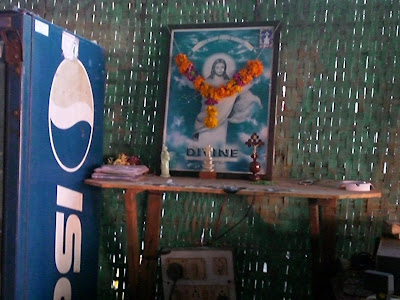So This Is Christmas...
 the incorruptible remains light box display
the incorruptible remains light box display
Apparently, the Inquisition failed, because the symbols and practices of the old, familiar story appear as a natural element in India's miraculous chaos of textures, colors, and sounds. The charmingly piecemeal Nativities around town (so variously crafted and painted that even matched sets appear mismatched, placed on sand and bits of false greenery under roofs thatched of coconut fronds) proved no stand-in for distant loved ones, but I did see some amusingly bizarre observations of Christmas. On December 23rd as I sat on a step on the main road to Palolem Beach I heard a loud rendition of Jingle Bell Rock irregularly punctuated with feedback. A large truck that could have been a cattle hauler with its broad, fenced in, flat bed rolled toward me along the dusty lane. As it passed, three dark, shriveled men, all wearing Santa hats, bobbed their heads lazily in the cab. In the bed of the truck 6 Indians sat on cushions, some reclining against the slats of the fence. One young woman was flanked by 2 men, and 3 other men sat facing them on the other side; the young woman was singing into a microphone while the men tended the electronics and kept the speakers from tipping over. This group occupied about two-thirds of the truck-bed while the last third was set apart by a red curtain. So, as the truck passed by onlookers, the crowning glory of the pageant on wheels was revealed, a living Nativity (Indian Mary and Joseph with a 10 year old Jesus wrapped in white and sitting placidly on a pile of hay in front of the curtain) plus an emaciated Santa wearing a frighteningly immobile plastic mask and (last but certainly not least) a skinny boy of the same age as Jesus wearing a dirty t-shirt and shorts, just along for the ride.
These motley exhibitions, cobbled together out of available bits and baubles, simultaneously tender and careless, embody the haphazard nature of Goa itself. While the old traditions remain and the native population endures, the state’s beaches, tourist infrastructure, and familiar cultural elements, make it a popular place for foreign travelers during the holiday season. Tourism provides 25% of the state’s income, and locals roam the beaches selling bananas, papayas, coconuts, jewelry, massages, boat rides, books, magnets (for what purpose I have no idea), sarongs, and ear cleaning services. It is the cheapest place in India to buy alcohol, and restaurants grill up the day's catch every evening at sundown, often organizing "parties" where tourists engage in what must look like frivolous leisure at best and total debauchery at worst to the modest locals.
The mixture of midnight mass and holiday indulgence, tradition and a mad amble to make as much money as possible at whatever cost during the short tourist season is, as far as I can see, Christmas in Goa. In the past few years I have heard globalization referred to as “the new colonization” several times, and although I'm not sure what that means in terms of hard facts, the comparison suggested itself often during the peak of the season; the high concentration of foreigners painfully sharpening the contrast between the rich and the poor. Indians from all over the country, as well as Nepalese and Tibetans, come to Goa to work in and around resorts for a pittance, while we westerners lounge on sun beds or towels oiling our skins, ordering food and drink, reading, swimming, sporting, and listening to digital devices worth the amount that our waiters make in a year.
While my guilt over my position in the world pecking order was exacerbated by Dickensian ideas about the meaning of Christmas, I was unable to stem my growing imperiousness, and I found myself in a most uncharitable mood as the holy day approached. The service on Palolem beach, often sullen and disorganized, grated on my nerves, and so did the constant approach of hawkers. I often noted similarities between my expectations (time-efficiency, rationality, objective truth, precision) and the colonial tensions examined in A Passage to India. Like any American well indoctrinated with the idea of human equality regardless of economic position, I corrected myself, thinking that I’d be none too fast either if I were working for nearly nothing, but in the end, that truth didn't soothe me, and I wondered if the amazingly irritating manners of the waiters and hawkers of Goa was a form of passive resistance to economic dominance.
My anxieties are always tied up, in one way or another, with time, and I came to resent the amount of my day spent in fending off demands on my attention and my wallet. Walking from one end of the beach to the other, a 15-minute stroll, I was sure to be approached at least 10 times, if not more. “Madame, dolphin trip?” “Just you come look my shop.” “Drums?” “Coconut, banana, pineapple.” “You need room?” Every day, again and again and again. Well scrubbed, respectable-looking children between 7 and 12 sometimes approached and forced first a handshake and then a certificate on their target. The certificate proclaimed that the child really is deaf, dumb, or disabled in some way and has official sanction, granted by their school, to beg. The first time I saw one of these official beggars I was sad, the second I was indignant (that begging was the skill being taught to them), and finally I became resolutely oblivious. By the end of my second week on the beach I generally declined to make eye-contact with anyone; if someone stepped in my path I walked around without looking, and I sometimes made a dismissive hand gesture, as if I were brushing away an annoying insect, to more persistent pursuers.
Honestly, I had developed a thick callous over my compassion by my third week in India, but this single-minded determination not to be bothered seemed so much worse with Christmas approaching, as if I were inviting the tribulations (and only slightly hoping for the transformation) of Ebenezer Scrooge; but in the end, all my 1st world guilt got me is a clearer understanding of what I am, a person who enjoys the things that money can buy and doesn’t plan to give up her own comfort for the sake of others. In fact, the poverty of India allows me (whose means are limited in my native country) to spend 6 months free of responsibility, living as if I had been born to a life of ease; I am free because others are not.
You can probably tell by now that my Christmas was unusually disheartening. Poverty and inequality is so vast and systematic in this world that I wasn’t (and still am not) able to form useful questions about it, much less answers. I spent 22 nights on Palolem Beach, wanting to move but strangely paralyzed. A few days after a typically anticlimactic New Year's Eve, I relocated to a nearly empty beach, sparing myself the constant reminder of the disproportionate amounts of money in pockets, shedding any lingering illusions about the brotherhood of man, giving up on trying to justify my luck, and getting down to relaxing and enjoying it.








0 Comments:
Post a Comment
<< Home